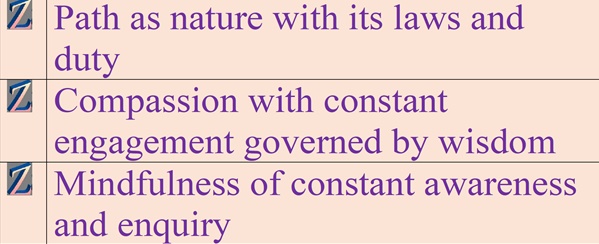Dukkha - compassion ending suffering for all

The next characteristic of Buddhism that Zandtaomed wants to consider in this pathtivist companion is dukkha – usually translated as suffering. There is a huge amount of suffering out there that just continues. For most people suffering just happens, that’s just the way it is for them; for most people a good day is when they suffer little.
This is a sad way to be, and the Buddha questioned this giving answers through the 4 Noble Truths. In this chapter this suffering is looked at as a pathtivist and examines how to use the 4 Noble Truths so that we can try to end suffering for all – the meaning of compassion.
Because of the pathtivist’s complete engagement we are engaged with all aspects of daily life in seeing suffering, those who are not engaged don’t always do this. Suffering arises from the defiled world we live in. Many people work in this defiled world, accept the wage from this defiled world and focus on their family, but in the family suffering arises. And then for the Buddhist focussing on suttas there is the suffering that arises from nature – birth, aging, sickness and death. Let us examine these sufferings.
I use the defiled world with a specific meaning, it is the world that develops from systemic kilesa – systemic greed, systemic aversion and systemic delusion. This is the world we live in. In Ch3 I spoke of our individual efforts to get rid of our own kilesa, this of course makes the world less defiled. But we live in a 1%-satrapy. Whilst the 1% have all that systemic power and influence individual changes lessening kilesa are not going to have much global impact. In fact the opposite happens, whilst you try to remove your own defilement there is conditioning happening around you that tries to suck you back into the kilesa of greed, aversion and delusion.
Whilst compassion for all is always in our consciousness, the purpose of removing our own kilesa is to end suffering in ourselves. As individuals the kilesa bring us suffering as well as systemically creating a defiled world. So we work on ending our own suffering by removing kilesa, and this has the knock-on effect of reducing the kilesa in the defiled world. But the defiled world is not our objective, that would be “greedy”. Follow your own path, remove your own kilesa, and in following your path see if there is wise engagement you can put into practice.
It is important to talk about family and community. The Buddha spoke of the importance of the Sangha, and there are many monasteries in line with his teachings providing refuge including the monastery Buddhadasa established at Suan Mokh. Great teachers like Thay have stressed the importance of community to help each other, and he has established Plum Villages across the world.
But for most people such communities are not within their purview, people live in families. And in these families there is great suffering, the daily life of families whilst nurturing also often gives suffering. Whilst families are brought together hopefully through love, love and compassion are not the daily practice. Each person following their path can help bring about harmony in the family. Each person meditating and developing the 4 Brahma-Viharas of compassion, loving-kindness, empathy and equanimity can help bring about harmony in these families. But there is suffering.
It is important to accept that suffering can arise for in suffering we can also learn. The most significant relationship in my life gave me tremendous suffering but taught me love. Once you have loved it is not forgotten. Whatever pain the relationship gave me was only temporary the love was permanent – even though the relationship wasn’t.
If we follow our paths then we navigate ourselves through the suffering that is in family by bringing the 4 Brahma-viharas to the difficult situation. In all families there will be times of joy, following your path will add to that joy and help lessen the suffering that family can bring.
And then we have the natural suffering of the impermanence of life – birth, aging, sickness and death. At birth the mother suffers and the baby has to learn to survive in this defiled world. Throughout life there is sickness and as we get old the body starts to cause ill health as it naturally decays. And for some death can be painful whilst for others dying is natural and causes little suffering – Wild at Heart the deaths of Trevanion’s father and Duplessis as they wander out into the bush and die under the stars? 
As I said there is much suffering out there, the suffering caused by a defiled world, the suffering caused in families and the natural suffering in life itself. But the Buddha gave us the 4 Noble Truths to overcome suffering, here is what Buddhadasa said about them (transcribing not finished but there are references to the complete audio).
To overcome suffering the Buddha looked at desire, then taught us how to overcome suffering by not clinging to desire, and then gave us the Noble 8-Fold Path to do this in daily life.
So let us look at desire. Nature gave us desire from birth through instinct to survive and then later to procreate, but nature also gave us the desire to follow the path. As we mature into adulthood desire moves from instinct to the path, but unfortunately, in our defiled world of conditioning that starts with instinct, we have developed egos that our desire attaches to so for many of us the desire for the path to find itself has been submerged. In the defiled world we cling to the desires that create ego, and we don’t follow the path.
I tend not to use the term desire to describe the path finding itself, this is just a natural law. So for me desire is a term used for what arises from defilement, instinct and ego. It arises naturally from kilesa, instinct or ego but we don't have to follow these desires, and if we let them go there is no attachment. Teal Swan, as usual, raises excellent questions on the spiritual orthodoxy of desire. We cannot repress desire but that is not the meaning of "letting go", however if we are not careful the way we deal with desire can be repressive. Instincts including sexual desire have to run their natural course. That does not mean every sexual desire has to be lived out yet at the same time repressing lust causes problems; we try to find harmony not repression in the way we deal with lust - and defilement, other instincts or ego.
Teal quite rightly emphasises the desire for authenticity - as she describes it the desire that vibrates with higher self - being in the now, but there is no need to see a conflict between pathtivism and this authentic desire. I have described this higher desire as the law of the path finding itself, it is perfectly reasonable to describe this as desire - it functions in that way. The important agreement is that there is a focus on finding the path, being authentic - being in the now or vibrating with higher self. I prefer to see a difference in the desires that arise from kilesa, instinct or ego and the Teal desire of authenticity - what I term the law of the path finding itself, in a harmonious way pathtivism seeks authenticity and lets go of desire arising from kilesa, instinct or ego.
As an aside it is good for pathtivism to be tested through constant enquiry. If there are inconsistencies between the great teachers such as Thay, Eckhart Tolle and Teal Swan then there needs to be a concurring explanation; if there isn't there must be weakness in pathtivism.
In understanding the path in this way of finding itself, we can overcome suffering by following our paths – living the path’s desire of finding itself, but instead we are lost in the world of conditioning and instinct. Our conditioned world is the defiled world, and mix that with the varying levels of instinct and path we can see how most people spend their lives hovering between the desires of the defiled world – greed, aversion and delusion, and the instinctive desires that focus around family.
In these instinctive worlds – defilement and family – people are not following their paths, and so we have suffering. There is an instinct for family that is procreation, but I am not then saying that everything in family is just instinct. Within families there can be path but because there is instinct there is suffering, where there is not suffering there is path. Of course within family there can be love, and love is path, but where it is not path is suffering.
Within this instinctive need for survival in this defiled world is money. In our current defiled world it is not possible to survive without money, this was established colonially through the introduction of taxes. To get this money we are forced into wage-slavery, and throughout the world people require a certain level of money to bring up their families. Within this infrastructure of wage-slavery and money for family, people manage to find other things that will give them some form of enjoyment. For some as opposed to materialism and escapism these forms of enjoyment can come from being authentic – a sign they are following their paths.
In the 4NT the Buddha taught us to follow the 8-Fold path by not clinging to the desires that come from instinct and the ensuing conditioning. As a result of practising the understanding of the 4NT we can harmonise desires, focus on our paths, and find the compassion inside that nature gave - the compassion to end all suffering.
Next/Companion Contents/Previous
|





